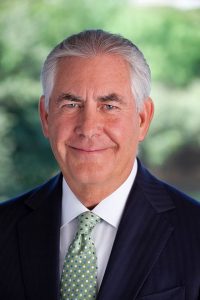Free Expression Report Card: Rex Tillerson
Position within the Trump Administration: Tillerson has been nominated for Secretary of State, and has already undergone Senate confirmation hearings.

Previous position: Chairman and CEO of ExxonMobil (2006-present)
- During his confirmation hearings before the Senate Foreign Relations Committee, Tillerson was asked whether he will bring a press corps with him when he travels to maintain an accountable and transparent department through regular interactions with the media. He stated that if confirmed he “will look into what is appropriate,” but did not expressly commit to having a traveling press corps, noting that he “hasn’t gotten that far in his thinking.”
- During his confirmation hearings, Tillerson indicated several times his reluctance to accept evidence of human rights abuses reported by the media.
- When asked if Russia and Syria’s targeting of hospitals are war crimes, Tillerson replied that he “would not want to rely solely on what has been reported on the public realm before making that conclusion.” Media outlets such as The Guardian, The BBC, and CNN, have reported widely on the bombing of Syria’s hospitals by Syrian and Russian forces.
- When asked if mass killings in the Philippines, under the orders of or tacitly encouraged by President Rodrigo Duterte, as reported by the Los Angeles Times, were human rights violations, Tillerson stated he would not “solely rely on what I read in newspapers.” The vigilante killings of people allegedly involved in the drug trade in the Philippines under President Duterte’s tenure have been widely reported.
- When asked if President Vladimir Putin was responsible for the murder of journalists and dissidents in Russia, Tillerson was reluctant to offer condemnation, noting that “people who speak up for freedom and regimes that are oppressive are often at threat and these things happen to them.” When pressed, he remained ambivalent, saying he did not have enough information on the matter “in terms of assigning specific responsibilities.”
- Tillerson similarly indicated he would ”need to have greater information on the matter” to come to any conclusions regarding Saudi Arabia’s human rights record.
- In his prior role as ExxonMobil president, Tillerson has been critical of journalists. During a 2012 interview on climate change with the Council on Foreign Relations, Tillerson stated that journalists were “lazy” and relied on information from “manufacturers of fear” in writing articles about ExxonMobil’s drilling for oil and gas.
- This view of journalists has seemingly extended to ExxonMobil’s interactions with individual news outlets. In 2016, under Tillerson’s leadership, ExxonMobil denied the Guardian’s request to cover its 2016 annual meeting on the grounds of “lack of objectivity on climate change reporting demonstrated by [the Guardian’s] partnership with anti-oil and gas activists and its campaign against companies that provide energy necessary for modern life, including newspapers.” This decision conflicts with Tillerson’s comments during the event itself, at which he stated, “the fact that people have different opinions on climate change; they have every right to their opinion, whether we agree with it or not, I will support their right to say so” – to the applause of many in the room.






